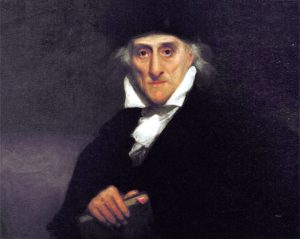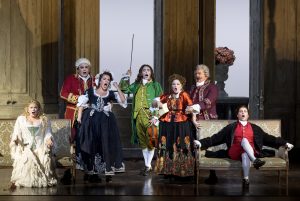
Editor’s note: In tandem with the Palm Beach Opera production of The Marriage of Figaro, here is an interesting history of Mozart’s librettist and his connections to the United States.
By Rex Hearn
Mozart’s librettist, Lorenzo Da Ponte, became an American citizen at age 79. He and Mozart worked together on three operas — The Marriage of Figaro (1786), Don Giovanni (1787) and Cosí fan tutte (1790). All three operas continue in the repertory to this day.
Da Ponte led a fast life in Europe. He was often mistaken for his good friend, the libertine Giacomo Casanova, the subject of Don Giovanni, the opera.
Lorenzo’s father, who was Jewish, married a Christian lady in 1749, his second wife. Together they had three sons and six daughters. Luckily, the bishop of Cenada (now Vittorio Veneto) educated the boys in his seminary. Ordained a priest in 1773, the boy dropped his family name, Emanuele Conegliano, and took the bishop’s name, Lorenzo Da Ponte.
Starting at age 24, he served in seven parishes in 10 years, being threatened by breach-of-promise lawsuits or chased out of town by angry husbands. He loved the ladies. Switching to dramaturgy, a profession his education merited with the bishop’s blessing, he ended up in Vienna at the Burgtheater, working in the enlightened court of Emperor Joseph II, where he wrote libretti for the likes of Salieri, Padre Martin y Soler, and Mozart.
The Marriage of Figaro was an immediate success in Vienna and the Prague Opera house manager said of Don Giovanni’s long run, “A most brilliant, attentive audience. Long live Mozart, long live da Ponte: While they exist no manager shall know distress.” Emperor Joseph died in 1790 and with him the Italian Opera Company of Vienna; Da Ponte was out of a job.
In 1791, the year Mozart died, Da Ponte, acting as a go-between for a rich Vienna friend who was about to enter an arranged marriage in Trieste with the lovely Nancy Grahl, he married her himself and moved to London, where he became poet to the King’s Theatre for seven years. Had Mozart lived he could have succeeded the London Bach (J.C. Bach, Sebastian’s youngest child) as court composer, a post secured for him by his English diva, Nancy Storace.
Da Ponte and his wife had three children in London: Louisa, Fanny and Lorenzo. Her druggist father and family had emigrated and settled in Sunbury, Pa. In 1804, Nancy chose to visit them. It was a wrenching parting, Da Ponte tells us in his memoir. Lonely and despondent, Da Ponte’s bookstore in London was not doing well. In 1805 he sold up, leaving him with 100 guineas to pay for his passage to America. He was 56 and had had a hand in writing, adopting or translating 50 operas up to this point.

A great reunion was held in a New York City hotel. Changing professions, he opened a grocery store with money borrowed from his family. “I laughed to myself every time my poetical hand weighed out two ounces of tea, measured a yard of plug tobacco, or a morning dram for three cents,” he wrote. A fourth child was born, Charles, or Carlo, in 1806.
Alas, he had extended far too much credit and had to close the shop. He tried his luck at a laundry and wash house; they did not last very long. To make ends meet, he gave Italian lessons. He tried many unsuccessful ventures for over a decade, then opened a bookstore. Thinking he would retire, he took some books into a Broadway bookstore to sell.
Striking up a conversation with a young man in the shop 30 years his junior, he found he knew a lot about Italian literature.
That young man was Clement Clark Moore, son of the president of Columbia College (later university),and author of the holiday poem ’Twas the night before Christmas. Moore acted swiftly, telling his father about his new acquaintance. Da Ponte was made the first professor of Italian literature at Columbia in 1825. He was 75. Retirement could wait. Over his time there, he taught 2,500 students and ran a very successful lending library and bookstore. The books were shipped from Italy by his two brothers.
Feeling secure, he returned to the theater as a patron. He invited an Italian opera company for the 1825-26 season, backed by a wealthy wine merchant, Dominick Lynch. He then invited another group of Italian singers over, led by Giacomo Montresor. They gave 35 performances at the Hill Street Theatre, renamed The Italian Opera House for the occasion of their visit. It was an artistic success but a financial disaster.
Undaunted, he planned a permanent home for opera, raising $30,000 on his own, built it in under a year, and opened it on November 18, 1833. Da Ponte was 84. The new house had a tier of exclusive boxes for $6,000 each, in such demand that lots were drawn for purchase. In its second year, proceeds of an opera performance were given to Da Ponte upon his retirement. He died in 1838 at age 89.
In his four years of retirement, students and friends were welcome to stop by his Brooke Street home in lower Manhattan where he was known as a good host, serving great food.
Here was a man best remembered as Mozart’s librettist who brought professional opera to America. It’s believed he might have preferred to be remembered as the first professor of Italian literature at Columbia University. In Vittorio Veneto, Italy, his hometown near Venice, a street is named for him.
No plaques or memorials exist here to honor him.
Rex Hearn founded and directed the Berkshire Opera Company from 1985 to 2009.